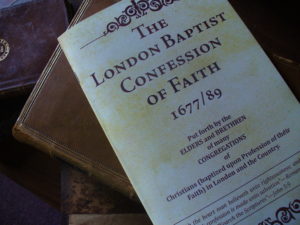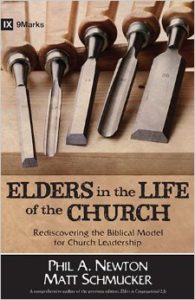Elders? Aren’t elders a Presbyterian thing? Don’t the Mormons have elders too? What do elders have to do with a Baptist church?
These questions are understandable. Especially since elders are a new thing for our church. What may surprise you is that elders aren’t just a modern church fad, but rather are an historical form of church governance, even for Baptists!
Historic Baptist Position
Arguably the most famous and influential confession of faith among Baptists is the London Baptist Confession of Faith (1689 LBC). Regarding the church, it says, “The officers appointed by Christ to be chosen and set apart by the church are bishops or elders and deacons.”
 A few things are important to note here. First, two offices in the church are affirmed, elders (Greek: presbuteros) and deacons. Notice also that elders are regarded as synonymous with bishops (Greek: episkopos, which is also translated overseer). This is important since churches today in a move toward biblical eldership miss the mark and end up with three offices, i.e., pastor, elders, and deacons. Rather, this historic confession and the historic practice of Baptist churches has been to recognize the two offices outlines in Scripture: elders and deacons.
A few things are important to note here. First, two offices in the church are affirmed, elders (Greek: presbuteros) and deacons. Notice also that elders are regarded as synonymous with bishops (Greek: episkopos, which is also translated overseer). This is important since churches today in a move toward biblical eldership miss the mark and end up with three offices, i.e., pastor, elders, and deacons. Rather, this historic confession and the historic practice of Baptist churches has been to recognize the two offices outlines in Scripture: elders and deacons.
It must also be noted that elders and pastors are regarded in this historic confession as the same office. In the same section, the famous confession also says, “an obligation lies on the elders or pastors of the churches to be urgently preaching the Word by virtue of their office.” Here, it is quite clear that elders and pastors are synonymous, they are one and the same. We can then see that Baptists historically have recognized the two offices of the church being elders (also called pastors, bishops, or overseers) and deacons. This is not a new idea.
Second, what we also see from this historic confession is that our forefathers in the Baptist heritage recognized a plurality of elders. It speaks of appointing elders (plural) when it says:
“The way appointed by Christ for the calling of any person fitted and gifted by the Holy Spirit for the office of bishop or elder in a church, is that he is to be chosen by the common consent and vote of the church itself. Such a person should be solemnly set apart by fasting and prayer, with the laying on of hands of the eldership of the church (if there be any previously appointed elder or elders).”
By noting churches in history we see that a plurality of elders/pastors in Baptist churches was common. There was commonly an “eldership,” i.e., a plurality of elders/pastors that shared the responsibility of leading and exercising oversight over the church.
So what happened?
 Why does the “normal” Baptist church function with a single pastor and with a board of deacons? Why does eldership, a plurality of elders/pastors leading the church seem so foreign to us if it’s an historical position?
Why does the “normal” Baptist church function with a single pastor and with a board of deacons? Why does eldership, a plurality of elders/pastors leading the church seem so foreign to us if it’s an historical position?
In his book, Elders in the Life of the Church, Phil Newton offers two explanations. The first, the rise of individualism in our culture. This cultural trend led to a suspicion of authority in the church with many churches limiting the leadership to a single pastor so that more authority rested in the individuals in the congregation. This reaction is unfortunate since Baptists have maintained that elders lead under the final authority of the congregation. Authority and submission are not dirty words. God demonstrates this in the inner workings of the trinity and by giving church, civil, and family structures positions of authority and submission.
The second factor that Newton mentions that has led to a model of church governance where there is a single pastor is how churches have begun to resemble big businesses and adopting corporate structures of leadership.  The pastor became more of a CEO with a board of directors leading different groups of volunteers that were determined to “grow the business.” This has led to a professionalism among church leaders, a growing trend of moral failure in pastors, short-lived pastorates where the pastor uses churches like stepping stones as he climbs the corporate ladder. [Note: The book shown here is NOT recommended!]
The pastor became more of a CEO with a board of directors leading different groups of volunteers that were determined to “grow the business.” This has led to a professionalism among church leaders, a growing trend of moral failure in pastors, short-lived pastorates where the pastor uses churches like stepping stones as he climbs the corporate ladder. [Note: The book shown here is NOT recommended!]
It is time that we, like our Baptist forbearers anchor our church structure and practice in the teachings of the Scriptures. Let us not conform our church to the popular designs or trends of our day, but apply the paths of Scripture, knowing that we stand in an historical tradition that has done likewise.
The primary focus for church leaders today must be to understand what God’s Word teaches, and then to order their churches accordingly. History merely serves to affirm the veracity of Scripture — Phil Newton
